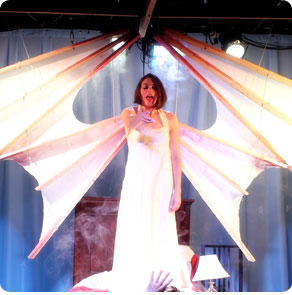The first thing that happens in Angels in America Part I: Millennium Approaches is that everything changes. The opening set includes a randomly positioned telephone, a couple of chairs and a wood box that looks like a coffin. The lights go down, the actors emerge in the dark, move everything around, and then walk away. It’s a perfect opening for a play about the way we all deal with change. Not just any kind of change, either, but the kind which happens in the dark, in the shadows, when we’re not looking, when we’ve shifted our eyes — our hearts — for a moment.
Sure, Angels in America is a play about the AIDS crisis. It’s about being gay in America. It’s about the duplicitous relationship between religion and faith. About corporate greed and justice and democracy, and about imperfect love which strives for the impossible while convinced it is possible. It’s about how that striving pulls us ever closer to the brink of insanity, and how insanity is sometimes the closest thing to sanity in an insane world. (All those sorts of existential contemplations to which artists are prone.)
But, really, it’s about choices and change. Part One, after all, is titled Millennium Approaches.
We start focused on Roy Cohn (Michael MacCauley) and Joe Pitt (Andrew Hampton Livingston) — the former a pissed-off, prideful, powerful lawyer; the latter a self-conscious young clerk. Cohn angers himself to a point where you think his brain might pop right out of his skull, while Pitt tries to stay calm and consider an offer to work in Washington, DC. He uses his Mormon faith and his wife — who is both the most blatantly insane and, at times, enlightened character in this play — as an excuse to keep him from his ambitions. But, it’s clear from the beginning Joe just doesn’t handle choices or change very well.
Next up, there’s Louis and Prior (Dusty McKeelan and Willie Repoley, respectively) — a loving but tortured odd couple. Louis is an uptight, guilty, pleonastic Jew; Prior is an emotional but dismissive former drag queen whose HIV has just become full-blown AIDS, and who is now exhibiting signs of Karpi Sarcoma. Louis freaks out – he can’t handle choices or change either – and Prior has to basically suffer alone. Fate — or whatever you choose to call it — brings Joe and Louis to the same restroom at the Federal Courthouse in lower Manhattan, and a friendship sparks.
There’s more to the story, of course. (Angels in its entirety would be a roughly seven-hour production.) But, it’s best to just experience the story for yourself.
The play won writer Tony Kushner a well-deserved Pulitzer, so it goes almost without saying that the script could be poorly acted or just straight-up read, and still come off as an arresting, emotional quest for truth. But, it’s a treat to see it so well-acted and well-produced as it is here at N.C. Stage.
Though their storylines seem to be mostly peripheral, it’s Roy Cohn (MacCauley) and Joe’s wife Harper (Rebecca Morris) who steal this show. Their delivery of the angry and the insane, respectively, is both honest and provocative. Both actors are champions of subtlety, and their scenes feel more solid and definitive the further the story goes. Though they are the easy standouts, the rest of the cast is nothing to dismiss. McKeelan’s ability to straddle likeability and neurosis is impressive; and Repoley’s complex, subtle handling of his very sick character is also commendable. Still, it’s Part II where Livingston’s character gets to spread his wings, with more prominence from Belize (a charming Nathan C. Walker) coming in that half as well.
All this to say, Angels Part I is wonderfully produced at N.C. Stage, changing things just enough to leave an audience to return for Part II. Angels in America Part I: Millennium Approaches is running, along with Part II: Perestroika, now through Nov. 13 at N.C. Stage.




Nice review from your new reviewer.